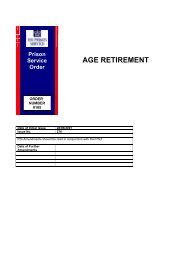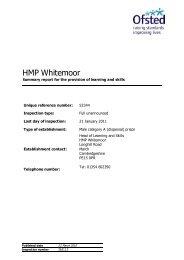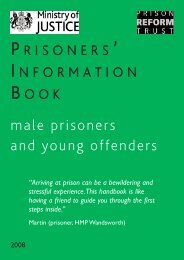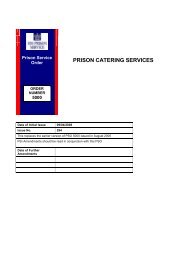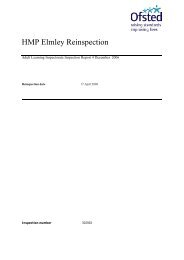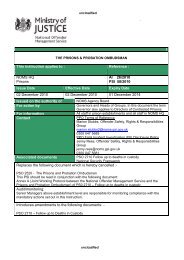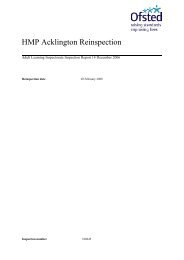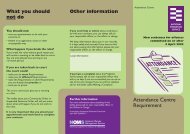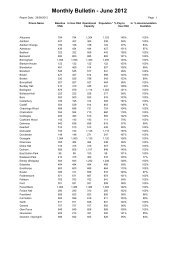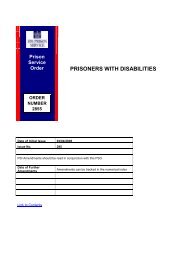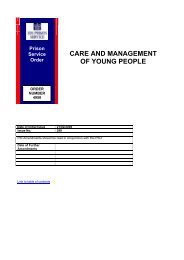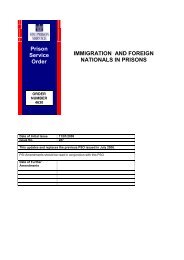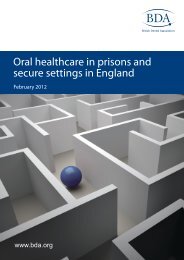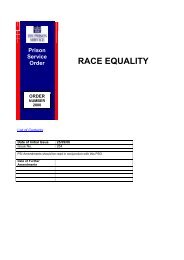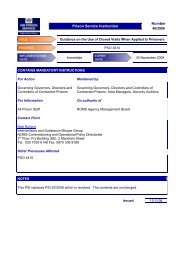PSI 2011-049 - Inside Time
PSI 2011-049 - Inside Time
PSI 2011-049 - Inside Time
Create successful ePaper yourself
Turn your PDF publications into a flip-book with our unique Google optimized e-Paper software.
UNCLASSIFIED PAGE 72.15 Letters sent at public expense must be sent first class or by air mail if:(a)(b)(c)they are Special Letters sent on transfer;they are in connection with an appeal;exceptionally, postage at the higher rate has been approved by the Governor.2.16 The correspondents of some prisoners may wish to send them stamped addressedenvelopes, bearing their return address, to encourage them to write letters and to help with thecosts. This must be allowed and no deductions must be made from the private cashallowance for the cost of the stamps or envelopes received.2.17 Additionally, correspondents may send in monies to prisoners in the form of cheques or postalorders which will be credited to their private cash account and should be managed inaccordance with the guidance covered in PSO 4465 Prisoners Personal Financial Affairs.Correspondents2.18 A prisoner may write to, and receive letters from, any person or organisation, subject to theacceptability of the contents and to the restrictions set out further in this <strong>PSI</strong>. However, itdoes not necessarily follow that because a prisoner is in correspondence with a person ororganisation that he/she may be visited by that person or a representative of thatorganisation.2.19 If the recipient of correspondence from a prisoner requests in writing to the prison that nofurther letters should be sent, the prisoner must be informed of the request, asked to cooperateby not writing and given the opportunity to discuss the matter with a member ofstaff. If the prisoner then hands in a further letter for posting, the prison must comply withthe recipient's request and inform the prisoner that the letter and any subsequent letters tothe intended recipient will not be sent. The letter will then be returned to the prisoner.Correspondence with children (defined as someone under 18 years of age)2.20 If a prisoner wishes to correspond with a child, the procedures set out above in paragraph2.19 will be applied if the person or authority having parental responsibility for the care ofthe child requests that the correspondence between them is stopped.2.21 Prisoners identified as presenting a risk to children are managed under SafeguardingChildren procedures and any contact with a child must comply with the Child Contactprocedures contained within Chapter 2 of the Public Protection Manual. This means thatany prisoner falling under this category must first apply to a member of staff in order tocorrespond with a child. Where these safeguarding procedures apply contact with childrenwill only include contact with the prisoner‟s immediate family or children, and the children ofa partner provided they were living together as partners in an enduring family relationshipprior to imprisonment. Included within this definition are sons and daughters, brothers andsisters, grandchildren, stepchildren, adopted children and foster children. A prisoner maybe permitted contact with other children provided the prisoner can produce a substantialcase for contact and the Governor agrees that such contact would be in the interests of thechild and only after a full risk assessment had been carried outCorrespondence with young prisoners2.22 If the Governor considers that correspondence between a prisoner who is under 18 andany other person would not be in that prisoner‟s best interests, they may stop thecorrespondence, taking into account the views of the prisoner‟s parent or guardian. If the<strong>PSI</strong> 49/<strong>2011</strong> UNCLASSIFIED ISSUE DATE 26/09/<strong>2011</strong>



